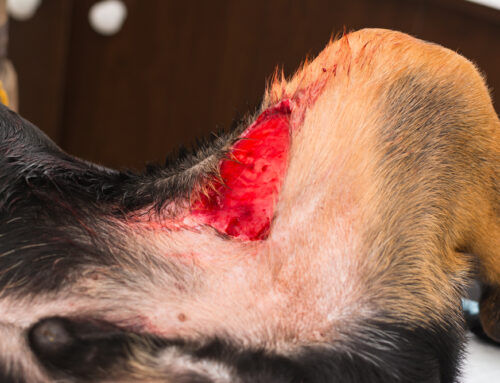Your pet is a champion hunter and a fierce predator, and can take down any prey that wanders across their path. However, since your furry friend has been domesticated for millenia, their prey now largely consists of catnip mice, wayward socks, and insects. When bugs creep inside your home, your vicious pet springs into action and attacks. Unfortunately, some bugs can bite—or sting—back, causing your pet serious discomfort, illness, or a severe allergic reaction.
To keep your ferocious hunter safe from all manner of biting, stinging, and bloodsucking pests, our Alpine Animal Hospital team has put together a comprehensive bug bite guide for pet owners.
Common bugs that “bug” pets
While billions of bugs can irritate your pet, here are a few that most commonly cause health issues:
- Fleas — Fleas have powerful hind legs and narrow bodies, and can easily sneak through your pet’s fur, causing skin irritation and inflammation wherever they go. Pets who are allergic to a flea saliva protein can become intensely itchy, lose hair, and develop scabs and skin infections.
- Ticks — Ticks are especially cringe-worthy because they can transmit a list of diseases to your pet. Ticks generally must remain attached for several hours to transmit illness, so spotting and removing them promptly is essential for keeping your pet healthy. Search through your pet’s fur—namely around their ears, eyelids, under the tail, between the toes, and in the groin—for ticks, which range from the size of a tiny sesame seed to a large grape. Ticks come in a variety of hues, from reddish-orange to brownish-gray.
- Mosquitoes — Mosquitoes are generally easy to identify, especially if they are attacking you at the same time. The most serious mosquito-borne illness in pets is heartworm disease, which can be fatal.
- Flies — Numerous fly species can irritate your pet and cause significant welts and swelling, although certain species can cause more serious problems. For example, botfly eggs can hatch into cuterebra larvae (i.e., warbles) that can lead to a skin abscess.
- Spiders — All spider bites will cause your pet discomfort, but two spider classes are more lethal. Widow spiders and recluse spiders can release potent venom into your pet when they bite, so watch out for these spiders, which have an hourglass marking on their abdomen (i.e., widow spiders) or a violin-shaped marking on their back (i.e., recluse spiders).
- Bees — Bee, wasp, and hornet stings can be painful for your pet. Bee stingers that break off in your pet’s skin can continue to transmit venom. While differentiating between the various types is generally not important, you can tell the difference by comparing the fuzzy, round body of bees to wasp and hornets’ shiny shell.
How to treat bug bites or stings in pets
Pets with mild allergic reactions to bug bites or stings generally only need monitoring for the next 24 hours to ensure their condition does not worsen. If your pet has been stung, scrape—do not squeeze—the stinger out with a credit card. To soothe the bite or sting site, apply a thick baking soda paste generously to the area. Your pet may need an Elizabethan collar (i.e., cone) to keep them from licking off the paste. You can also minimize swelling by applying an ice pack for 10 minutes to the injured area, keeping a towel between the ice and your pet’s skin. If your pet is particularly itchy, seems seriously uncomfortable, or develops a large swelling, they may need antihistamines and corticosteroids to minimize the reaction. Always speak to your Alpine Veterinary Hospital veterinarian to ensure any oral or topical medication you plan to administer is pet-safe.
When to head to the veterinarian for your pet’s bug bite or sting

If your pet has been bitten or stung by an insect, they may develop a severe allergic reaction that requires treatment. You should also monitor your pet’s moderate reaction, which may also need veterinary attention. Look for the following signs:
- Itchy skin
- Hives
- Redness
- Swelling of the head and neck, and around the eyes
If your pet progresses to a severe anaphylactic reaction, seek immediate treatment. Severe allergic reaction signs in pets include:
- Rapid facial swelling
- Extensive hives
- Wheezing
- Breathing problems
- Vomiting
- Diarrhea
- Change in mucous membrane color
- Cold extremities
- Collapse
A serious allergic reaction to a bug bite or sting generally develops in minutes, but delays can occur. If your furry friend is displaying an abnormally severe response to a bug bite, contact our Alpine Animal Hospital team for urgent care.







Leave A Comment